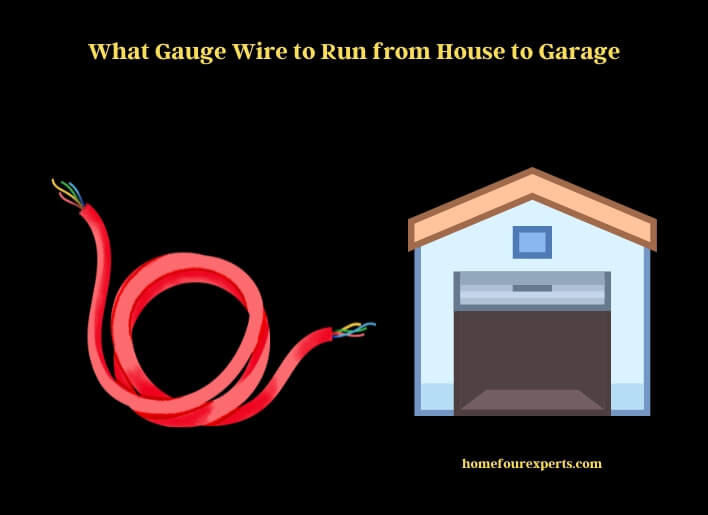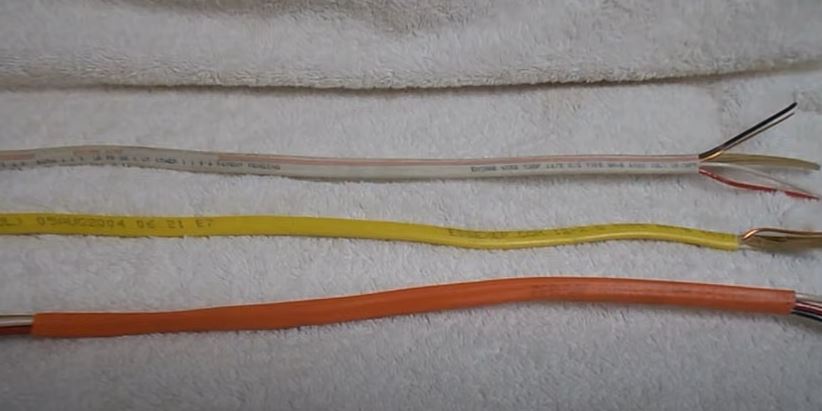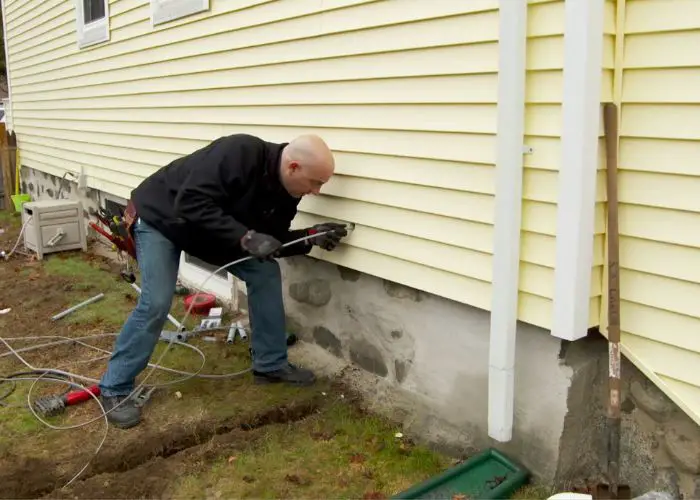There are a few factors to consider when determining what gauge wire to run from your house to your garage. The first is the amperage rating of your circuit breaker. Most residential circuits are rated for 15 or 20 amps, which limits the amount of current that can flow through the wires.

If you have a larger circuit breaker, you may be able to use a smaller gauge wire. The next factor is the length of the wire. The longer the wire, the more resistance it will have, and therefore you’ll need a thicker wire to minimize resistance and maximize current flow.
Finally, consider what devices will be plugged into the outlets in your garage. If you’re only running a few small appliances, you can get away with using a lower gauge wire than if you’re running multiple high-powered tools such as air compressors or welders.
If you’re planning to run a wire from your house to your garage, you’ll need to choose the right gauge (thickness) of wire. The type of wire you’ll need depends on the amount of current (amps) that will be flowing through it. For example, if you’re running a 20-amp circuit, you’ll need a 12-gauge wire.
If you’re running a 30-amp circuit, you’ll need a 10-gauge wire. And if you’re running a 40-amp circuit, you’ll need an 8-gauge wire. The thicker the gauge (lower number), the more electricity it can handle.
So make sure to choose the right gauge for your needs!
What Wire to Run Underground to Garage?
If you’re planning to run wire underground to your garage, there are a few things to keep in mind.
| First | You’ll need to choose the right type of wire. |
| Second | You’ll need to bury the wire deep enough so that it won’t be damaged by lawnmowers or other yard equipment. |
The best type of wire to use for this application is a direct burial (DB) cable. This type of cable is designed to be buried underground and is resistant to moisture and other elements. Be sure to purchase a DB cable that is rated for the voltage you plan to use (120 volts or 240 volts).
When burying the cable, be sure to dig a trench that is at least 18 inches deep. This will ensure that the wire won’t be damaged by any yard equipment. Cover the trench with dirt and then tamp it down firmly so that the cable is well-protected.
What Size Cable to Run to the Garage?
If you’re like most people, your garage is full of all kinds of tools, equipment, and other items that need to be properly stored and protected from the elements. And in order to do this, you need to have the right size cable running to your garage. Here’s a quick guide to help you determine what size cable you should run to your garage:
Amperage Rating of Your Circuit Breaker
Take a look at the amperage rating of your circuit breaker. This will tell you how much power your circuit can handle before it trips. For example, if your breaker is rated for 15 amps, then you’ll want to use 14-gauge wire for your garage circuits.
If your breaker is rated for 20 amps, then you can use a 12-gauge wire.
Distance Between Your Main Electrical Panel and Your Garage
Take a look at the distance between your main electrical panel and your garage. The further away the two are, the larger the gauge wire you’ll need to use in order to prevent voltage drop.
For example, if your main panel is 100 feet from your garage, then you’ll want to use 10-gauge wire for runs up to 50 feet and 8-gauge wire for runs over 50 feet.
Amount of Power Flowing Through Your Wires
Consider any other factors that might affect the amount of power flowing through your wires. Things like long runs or multiple appliances on one circuit can increase the amount of current flowing through the wires and cause them to heat up more than usual.
In these cases, it’s best to err on the side of safety and go with a larger gauge wire than what might be strictly necessary according to ampacity tables. So there you have it – a quick guide to help you determine what size cable you should run to your garage based on the amperage rating of your circuit breaker and the distance between your main electrical panel and your garage. Be sure to also consider any other factors that could affect the current flow, such as long runs or multiple appliances on one circuit, to ensure safe and efficient installation.
What Size Wire to Run 220 to the Garage?

If you’re running 220 volts to your garage, the size of the wire will depend on how far away it is from your main electrical panel. The further away it is, the thicker (and more expensive) the wire will need to be. For a 20-amp circuit, you’ll need a 12-gauge wire if the distance from the panel is less than 50 feet.
If it’s between 50 and 150 feet, you’ll need a 10-gauge wire. And if it’s more than 150 feet, you’ll need an 8-gauge wire. Of course, these are just general guidelines – always check with a qualified electrician before starting any wiring project!
Running Power to a Garage
If you’re like most people, your garage is probably where you keep all your tools, lawn equipment, and other things that you need around the house. But if you don’t have power running to your garage, it can be a real pain to have to go inside every time you need to use something. So what’s the best way to get power to your garage?
There are a few different options when it comes to running power to a garage. You can bury underground cables, run them overhead or even install a solar panel system. Each option has its own set of pros and cons, so it’s important to weigh all your options before making a decision.
Underground cables are often the best option for running power to a garage because they’re hidden from view and won’t be damaged by weather or other elements. However, they can be more expensive than other options and may require professional installation. Overhead cables are less expensive than underground cables but they’re also more vulnerable to damage from storms or falling tree limbs.
They also may not be allowed in some neighborhoods due to aesthetics. Solar panels are becoming increasingly popular as an option for powering garages since they’re environmentally friendly and relatively easy to install yourself. However, they will only work if there’s enough sunlight available and they can be quite an expensive upfront.
Running 240V to Detached Garage
If you’re planning on running 240V in your detached garage, there are a few things you need to take into account.
Determine the Voltage and Amperage
First, you’ll need to determine the voltage and amperage requirements of the devices you plan on using in your garage. Once you know this, you can determine the proper wire size and circuit breaker rating for your application.
Install a Conduit
Next, you’ll need to install a conduit from your main electrical panel to your detached garage. This will protect your wires from damage and make sure they’re up to code. Once the conduit is installed, you can then run your wires through it and terminate them at your main electrical panel.
Make Sure Everything is Working Properly
Finally, once everything is wired up, you’ll need to test it all out to make sure everything is working properly. This includes testing both the circuit breaker and the outlets in your garage. If everything checks out, then congratulations – you’ve successfully run 240V power to your detached garage!
What Size Wire for 100 Amp Service to Garage?
If you’re looking to wire a garage for 100 amp service, you’ll need to use a 4 gauge wire. This type of wire is thick enough to handle the high amperage without overheating. It’s also important to use stranded wire rather than solid core wire, as it’s more flexible and less likely to break under stress.
When running the wire, make sure to keep it at least 2 inches away from any other electrical cables or wires. It’s also a good idea to run the cable through the conduit so that it’s protected from physical damage. Once the wiring is in place, you’ll need to install a 100 amp circuit breaker in your main electrical panel.
This will provide power to your garage while protecting your home from overloads.
What Size Wire to Run to Shop?
If you’re running electricity to your shop, you need to know what size wire to use. The size of the wire will depend on the amperage of the circuit and the distance of the run.
For a 30-amp circuit, you’ll need #8 AWG (American Wire Gauge) copper wire.
If the distance is longer than 100 feet, you may need to go up to #6 AWG copper wire.
If you have a 40-amp circuit, you’ll need #6 AWG copper wire. If the distance is longer than 100 feet, you may need to go up to #4 AWG copper wire.
And if you have a 50-amp circuit, you’ll need #4 AWG copper wire. If the distance is longer than 100 feet, you may need to go up to #2 AWG copper wire.
Now let’s talk about aluminum wiring.
You should never use aluminum wiring for your shop because it’s not as safe as copper wiring and it can cause fires. So stick with copper wiring for your shop—it’s worth it for the peace of mind!

What Size Cable Do I Need to Run to My Garage?
If you’re planning on running cable to your garage, there are a few things you’ll need to take into account before deciding on the size of the cable.
| 1 | Distance of the run | The longer the run, the larger the cable you’ll need. |
| 2 | What type of devices will be connected to the garage | If you’re just running power, a smaller gauge cable will suffice, but if you’re adding lights or other devices, you’ll need a heavier gauge cable. |
| 3 | Attached to your home | If your garage is attached to your home, you’ll need to make sure the cable is rated for both indoor and outdoor use. |
With all that in mind, let’s take a look at some general guidelines for choosing the right size cable for your needs. For runs up to 50 feet, a 14-gauge wire will usually do the trick.
For runs between 50 and 150 feet, a 12-gauge wire is a good choice. And for anything over 150 feet, 10-gauge wire is generally best. Of course, these are just rough guidelines – ultimately it’s always best to consult with an electrician before starting any wiring project.
But following these tips should help you choose the right size cable for your needs and ensure that your garage has everything it needs to function properly.
What Size Wire Should I Run from My House to My Shed?
When it comes to running the wire from your house to your shed, the size of the wire will depend on a few factors.
- First, you’ll need to determine the distance between your house and the shed.
- Second, you’ll need to determine what type of wire you’ll be running.
- Third, you’ll need to determine the amperage rating of the circuit that will be used.
The most common type of wire used for this purpose is AWG (American Wire Gauge) copper wire. The further the distance, the larger the gauge number (thicker wires have lower numbers).
For example, if you’re running a 20-amp circuit and the length of the conductor between your house and the shed is less than 50 feet, then 14-gauge THHN/THWN-2 copper wire would be sufficient. If however, the length was greater than 50 feet or if you were running a 30-amp circuit, then 12-gauge THHN/THWN-2 copper wire would be required. Always consult with an electrician before starting any electrical project in order to ensure safety and code compliance.
What Size Wire Do You Run from Pole to House?
There is no definitive answer to this question as the size of the wire required will depend on a number of factors, including the distance from pole to house, the amperage rating of the circuit, and the type of conductor material being used. However, as a general guide, most homes will require anywhere from 10-gauge to 4-gauge wire for this purpose.
What Cable Should I Use for a Garage?
If you’re looking to wire your garage, you’ll need to choose the right cable. The most common type of cable used in garages is THHN, which stands for thermoplastic high-heat resistant nylon. This type of cable is ideal for use in hot and humid environments like a garage.
It’s also very durable, so it can withstand being run over by a car or other heavy equipment. Another option for wiring a garage is XHHW, which stands for cross-linked polyethylene high-heat resistant waterproof. This type of cable is also resistant to heat and moisture, making it a good choice for a garage.
It’s also more flexible than THHN, so it’s easier to work with.
Last Point
If you’re running the wire from your house to your garage, you need to make sure you use the right gauge. The wrong gauge can cause problems like fires or shorts. Here’s what you need to know about choosing the right gauge for your project.
Learn More:
- What Happens When Garage Door Cable Breaks?
- What Size Wire Should I Run to a Detached Garage?
- Why Does My Garage Door Make a Popping Noise?
- Do You Need Roof Vents in a Garage?
- How Much Health Does a Garage Door Have Rust?
About This Writer

Hi, I am Eric Devin and I am a professional interior architect. Since childhood, I've always enjoyed DIY projects! And, I have loved to solve simple household problems using essential tools and equipment. I have also acquired a lot of information about basic household tools settings by working with contractors.